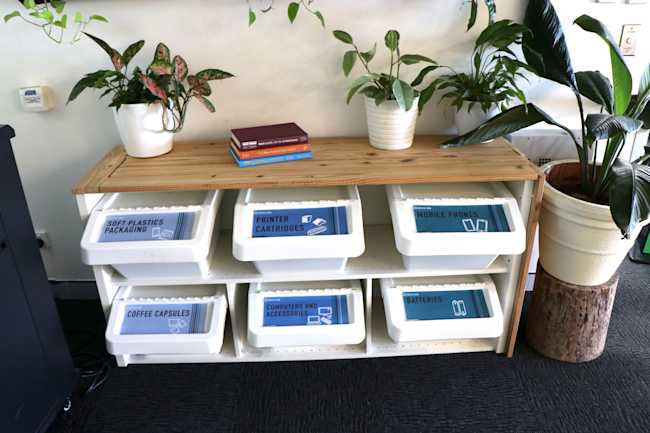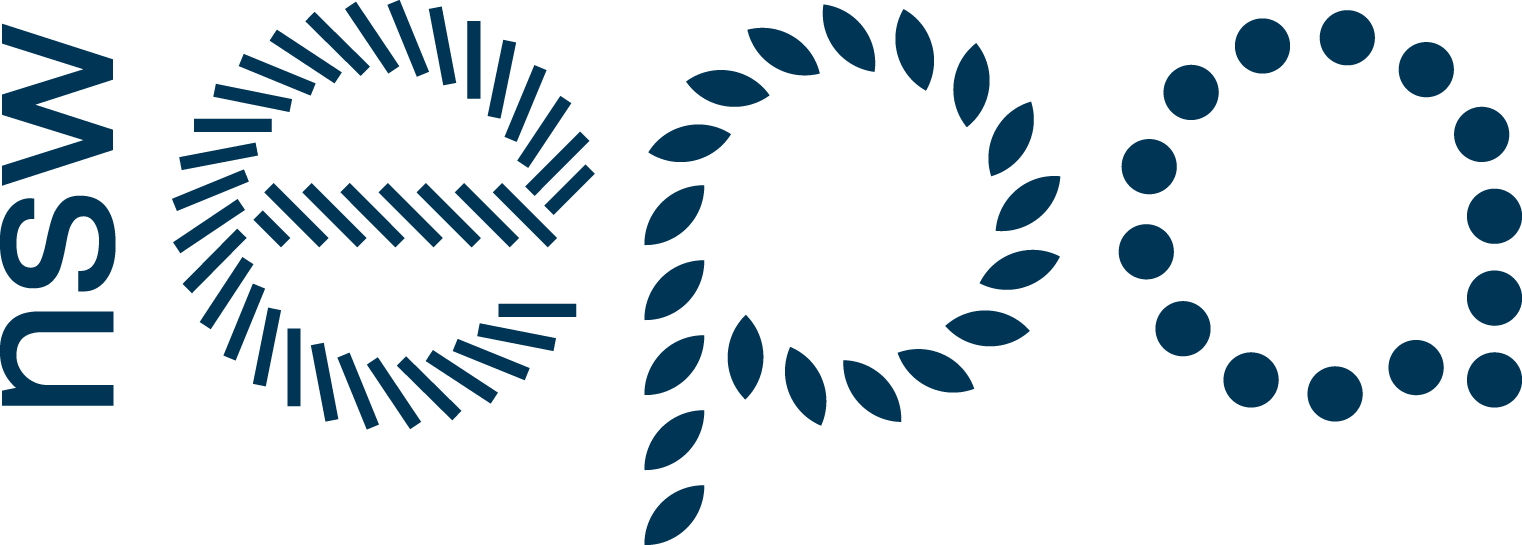How we turned the Planet Ark office into an eco-friendly workplace
By Rachael Ridley 13 April 2023
At Planet Ark we take responsibility for the environmental impact of our workplace and business operations by reducing our footprint wherever possible. This includes offsetting the emissions we produce by supporting amazing organisations in Australia and around the world who are working to restore and regenerate our natural environment. This means Planet Ark has been a carbon neutral organisation since 2017.
But offsetting can only do so much. To effectively mitigate climate change we will need to not only offset the emissions we all create, but also reduce our overall impact as much as possible. Want to know how we do it at Planet Ark? Read on for our tips!
1. Reduce energy use
We only use the air conditioner in the office when necessary. Fortunate for us, we’re located on the third floor, so we keep our windows open unless it’s too hot or cold.
We keep the air conditioner set at 23 degrees to reduce how much energy it requires and ensure we switch it off at the end of the day.
We make a habit of turning off appliances and devices at the socket when they’re not in use.
When buying new appliances, we pay a little extra for energy and water efficient appliances (which ultimately costs less in the long run).
We only run the dishwasher when it’s full.
2. Increase and improve recycling habits
We have lots of recycling bins in the Planet Ark office! Here are just some of the actions we take to separate recyclable materials and ensure they are kept in circulation.
Separate paper and cardboard from mixed recycling
For general recycling (i.e., the recycling that is collected by a waste contractor), we have two bins: one for paper and cardboard, and the other for mixed recyclables such as cans, glass, and plastic containers. Separating paper and cardboard from other recyclables ensures they are not contaminated (by mixing materials or broken glass) and have a better chance of being turned into high-quality recycled content.
If your workplace doesn’t manage its own waste (by hiring a contractor), you may need to reach out to the building manager to find out how the building’s waste is collected. It could be that the building already separates paper and cardboard from other recyclables. In that case, making sure your office or workplace has a separate bin for paper items will improve the environmental outcome of those materials. Just make sure you brief your staff and cleaners to increase engagement, so your good efforts don’t go to waste.
Collect cans, bottles, and cartons for cash
We have a recycling bin for drink containers that can be returned through our state’s Container Deposit Scheme (CDS). We’re located in NSW, so our scheme is called Return and Earn, which accepts most cans, plastic bottles, glass bottles, and beverage cartons under three litres.
When the bin is full, we contact our friends at ReCollect who pick them up and return them for a slice of the profit. The benefit of recycling containers through CDS is the containers are recycled into higher-quality materials because they aren’t contaminated by things like food scraps and grease. We also put the money we earn towards our work Christmas party!
Set up a recycling station for tricky items
We also have a recycling station with various boxes to collect items that can’t be put in a standard recycling bin. We collect the following materials and recycle them through the programs included in brackets:
Batteries (through Batteries 4 Planet Ark)
Stationery (we take these items to Officeworks)
Printer Cartridges (through Cartridges 4 Planet Ark)
Oral care products (we recycle these through Bupa’s Everyday Dental Recycling Program)
Electronics such as laptops, monitors, cables, keyboards, computer mice, webcams, and memory cards (we drop these off at Officeworks or recycle them through the National Television and Computer Recycling Scheme)
Mobile phones and accessories (through MobileMuster)
For tips on how to set up a recycling station at your workplace, see our handy guide.

3. Reduce food waste
We only order vegetarian or vegan food when catering for staff (we also use social enterprises whenever possible such as catering businesses that are run by and support refugees). This means all our food scraps can be composted relatively easily.
We carefully manage catering portions to prevent food waste.
We store catering leftovers properly in containers in the fridge and encourage staff to take them home or eat them for lunch the next day.
We have used a Bokashi bin in the office for food scraps in the past, but it does require a bit of effort as it ferments the food so it can be composted. The system requires at least one dedicated staff member to manage.
4. Improve use of paper and printing
We made all our forms digital.
We encourage staff to print on both sides of the paper, and only print the pages they need.
We have a tray next to the printer for pieces of paper that can be easily reused for notes or turned over and printed on again.
We recommend purchasing paper made of at least 50% recycled content (we always purchase 100% recycled paper and find there is no decrease in quality).
We recycle used printer and toner cartridges through our program Cartridges 4 Planet Ark.
5. Buy sustainably
All our crockery, cutlery, and Tupperware is second-hand, purchased from charity shops.
We try to purchase environmentally friendly products for the office such as cleaning products that are free of chemicals and toxins (there are supermarket brands such as Aware Environmental, as well as online retailers such as Biome and Flora and Fauna).
We try to buy products and packaging that have been made with recycled content such as office paper, toilet paper, and paper towel. We also aim to buy products we know can be recycled at their end of life.
We recommend choosing natural fibres that are compostable or biodegradable for items such as kitchen cloths, scrubbers, and bin liners.
Generally, we try to avoid excess packaging and single-use plastics. Buying in bulk is a great way to reduce packaging.
Where possible, we buy second-hand office furniture for the office. When furniture is no longer needed, we use an online marketplace to sell it or give it away so it can be reused by someone else, extending the lifespan of the product.
6. Encourage staff to do their bit outside the office
We encourage staff to use public transport, walk, or cycle when travelling to and from the office to reduce greenhouse gas emissions.
Bringing lunch and snacks from home is a good way to reduce single-use packaging (it also ensures leftovers don’t turn into food waste!).
We have reusable coffee cups in our cupboard in the office and often organise a walk to a café in the mornings to encourage staff to use them instead of getting their coffee in disposable packaging on their way in.
We purchase carbon offsets for car rentals and plane travel (these can be bought through the airline when you are purchasing your ticket).
Every year around National Recycling Week, we organise a clothes swap in the office. Staff are encouraged to bring in clothing, jewellery, and household items that they would like to part with. Anything left over is taken to our local charity shop.
Want to learn more?
Business Recycling has lots of free resources for workplaces and businesses to reduce their environmental impact. Here are some of our most popular resources:
Recycling Stardom Guide – this simple guide makes recycling at work easy, no matter your role.
Behaviour Change – tips on how to use behaviour change science to improve your colleagues’ recycling habits.
Signs and Posters – print off our free recycling and waste posters to make it easier for your colleagues to recycle correctly.
Choosing the Right Recycler Checklist – use this checklist and fact sheet to learn what types of questions you should ask waste contractors.
Rachael manages the Business Recycling and Recycling Near You websites. Rachael joined Planet Ark in early 2019 after eight years working in media and publishing as a producer, editor and writer. Rachael loves using her skills in content creation and communication to instigate positive environmental behaviour change. Outside of work, Rachael enjoys spending time in nature, listening to music and patting dogs.

